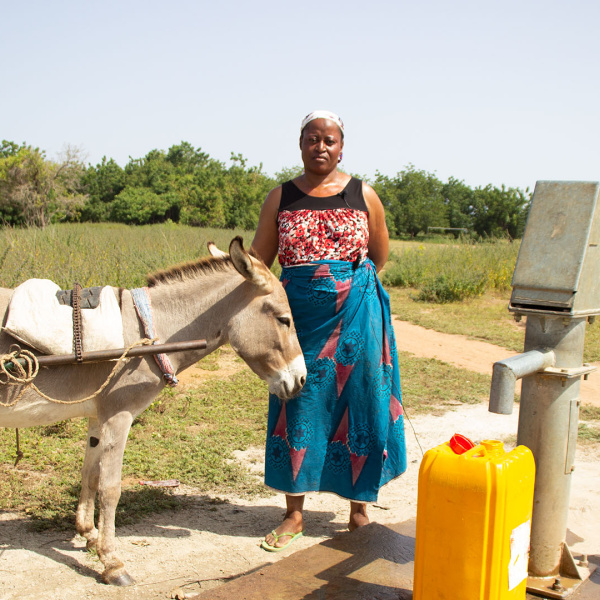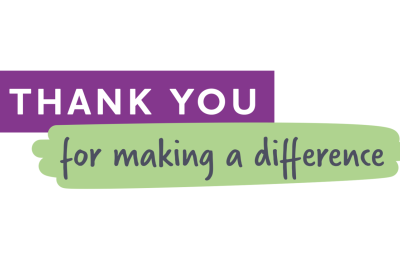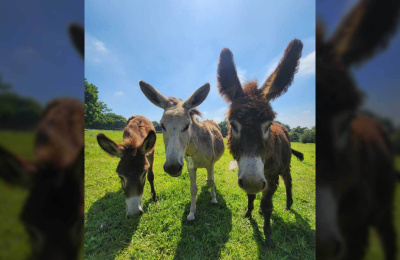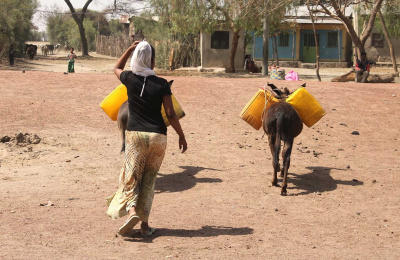We joined forces with Action Aid on a project in Sissala, northern Ghana, to help give donkeys better access to water, good nutrition and veterinary care, which in turn helps women support their families.
For thousands of years, working donkeys have been supporting women in poor communities by carrying loads, farming land and transporting people and goods.
Donkeys play an important part in boosting their owners’ income and help enable young girls to focus on their education instead of carrying water or fuel wood. Care for donkeys usually falls to the women and girls in families.
Greater access to water
A key aim our project with Action Aid is to give women better access to water by drilling new boreholes in strategic locations and reconstructing a water collection reservoir. Easier water access means better hydration for the donkeys as well as for water collection and its use in homes.
As part of the project, two boreholes have already now have been drilled in Sissala’s Chinchang and Nanchalla communities. Plans are also underway for 12 more boreholes in the future.
Mariama Braiamah, 43, lives with her husband and children in the Chinchang community. She is currently chair of the Similenu (which translates as ‘Don’t Undermine Me’) donkey women’s group.
If this video doesn't show, it may be because your cookie settings need updating. Manage your cookie settings.
Reflecting on the new boreholes, Mariama says: “We used to struggle a lot in search of water. We had only one borehole.
“With this additional borehole, we are free. As I go to pump the water, sometimes other women’s donkeys will come to the borehole to drink and I will gladly fetch water for those donkeys. We look out for one another’s donkeys.”
Mariama also noted the positive impact the new boreholes have had on her daughter’s access to education, saying: “When my daughter comes from school, I no longer tell her to stay home and fetch water. Now when she comes back from school, she is free [to do other things].”
Donkey welfare training
Another aim of the project is to offer donkey welfare and veterinary training to help women provide their animals with good nutrition, care, proper hydration as well as disease control.
Training manuals were distributed to teachers and children in Sissala to teach key concepts of donkey welfare. Training sessions focussed on increasing awareness of donkeys as sentient animals with feelings, deserving humane treatment.
Other training includes veterinary care to curb disease, which has a knock-on, positive impact on donkeys.
Training on making suitable, affordable harnesses supports community initiatives using local products, which in turn reduces injury and wounds helping donkeys to be more comfortable and productive.
Overall, healthy well cared for donkeys can better help women who rely on them to secure their livelihoods, making it easier for them to transport water and firewood, as well as people and goods to market.
Terence Tienaah, ActionAid’s Programme Manager, Upper West Region, says: “The donkey welfare project has been of great help as women involved are assured of improved care of their donkeys through veterinary services, donkey hydration systems and donkey accessories.
“It is helping women gain knowledge and skills on how to care for their donkeys at the community level. Through the boreholes provided for Chinchang and Nanchala communities in the Sissala East Municipality, the donkeys have improved hydration and minimized the hours women spend in accessing water.
“Under the project’s education and sensitisation activities, communities are learning animal-friendly and safe ways of communicating with their donkeys without inflicting pain on them.”
Looking to the future
Plans are now underway to redesign a further 12 boreholes across the 24 communities involved in the project.
As well as improving the lives of women and working donkeys in Sissala, this programme is a good example of how improving the health and welfare of donkeys has a positive impact on women’s lives.
We hope the project will encourage other communities facing similar issues.
Over the next five years, we are planning to invest more in programmes to support donkeys and their communities in West Africa. This is the first of many that will make a sustainable and lasting difference to so many lives.



